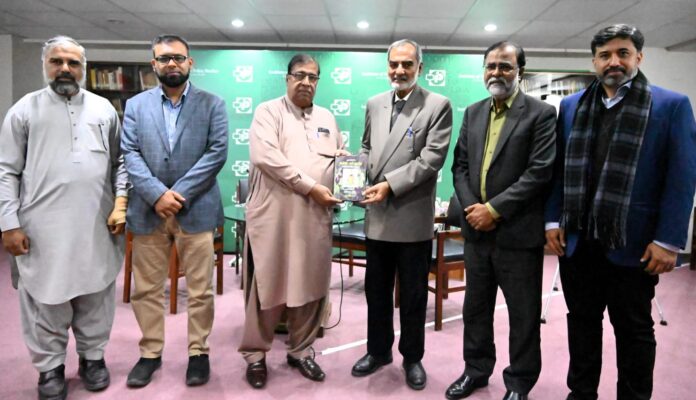Olive farming potential in Pakistan highlighted
DNA
Islamabad, November 30: Pakistan can become self-sufficient in edible oil within a decade if the immense potential of olive farming and millions of wild olive trees across Pakistan is realized. If harnessed to its full potential, indigenous olive oil production in the country can help save a staggering $4.5 billion spent annually on importing edible oil and lead to a thriving olive export market.
This was observed during a discussion at the Institute of Policy Studies (IPS), Islamabad, organized to shed light on Pakistan’s expanding potential in olive cultivation.
The discussion, moderated by Naufil Shahrukh, GM Operations, IPS, was addressed by Khalid Rahman, chairman, IPS, Dr Faiyaz Alam, general secretary Dua Foundation, Shabbir Soomro, author and journalist, and Dr Ghufran Saeed, Assistant Professor, Department of Food Science and Technology, University of Karachi.
Dr Faiyaz Alam and Shabbir Soomro have also recently co-authored a book on the history, status and potential of olive farming in Pakistan.
While introducing the work, Pakistan Main Zaitooon Ki Kashat – Tareekh, Tajurbat, Aur Imkanaat, Soomro highlighted that despite Pakistan having around 85 million wild olive trees, their full potential remains unexplored even by local people due to a lack of awareness and knowledge about the resource. The book, the culmination of extensive research, interviews, and expertise, addresses this gap in understanding and aims to bridge the awareness deficit that has hindered the exploration of this rich resource. He said that with an emphasis on nationwide awareness, the book endeavors to enlighten readers about the immense possibilities and benefits hidden within Pakistan’s olive trees.
Dr Faiyaz Alam emphasized the transformative impact of arid agriculture.
He deplored the mainstream media’s lack of interest in giving space and time to such issues, as well as the reluctance of governments to acknowledge and reward agricultural scientists and enterprising farmers who have contributed immensely in introducing valuable olive varieties and necessary food processing technologies.
Dr Faiyaz said that the efforts in the last few years, spanning areas of Sindh, Balochistan, Khyber Pakhtunkhwa, and Punjab, have seen the seeding of 5.6 million new olive trees across 50,000 acres of land. Two million of these plants are already yielding fruit and producing several tons of olive oil for local consumption and export.
He highlighted that around 75 percent of Pakistan’s edible oil is imported, and the $4.5 billion that the country spends on this can be saved through olive cultivation, making Pakistan self-sufficient in edible oil.
“Research for the sake of research leads nowhere,” emphasized Dr Ghufran. He highlighted that the lack of cohesion between academia, industry, and government is a dilemma obstructing the exploitation of agricultural assets like olives.
He stressed that a massive potential of wild olive trees is wasted every year because of the lack of awareness, and initiative at all levels.
In his concluding remarks, Khalid Rahman underscored that harnessing the potential of olive cultivation is not just about agriculture; it is a health and national economic imperative as well. It is time that “Pakistan must redefine its strengths and weaknesses,” he said while stressing the need for comprehensive awareness initiatives based on indigenous assessment of strengths and weaknesses.
In this regard, he highlighted that success stories in olive cultivation should be incorporated into educational curricula, and community institutions like madrassahs should be urged to motivate people with these prospects.
He underscored the need for an indigenous framework that connects research, local efforts, and societal motivation.
He said these efforts would produce not just agricultural growth but a holistic transformation of the national socio-economic fabric.

















